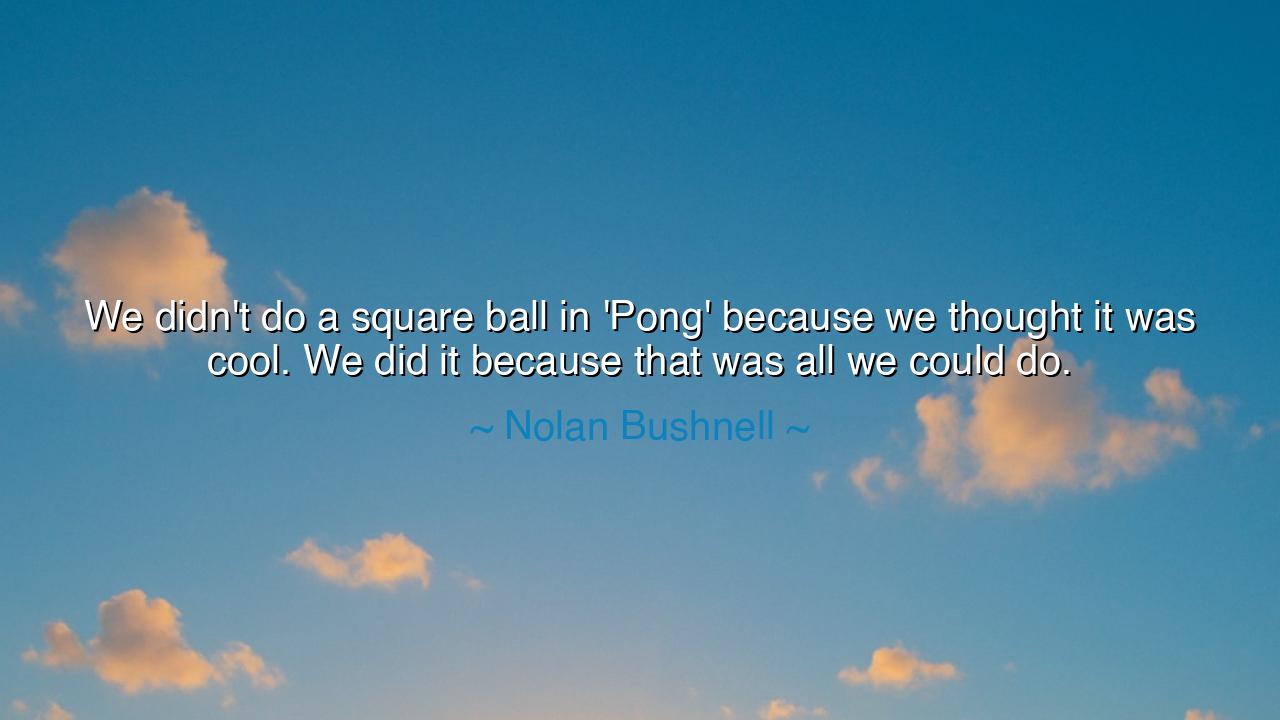
We didn't do a square ball in 'Pong' because we thought it was
We didn't do a square ball in 'Pong' because we thought it was cool. We did it because that was all we could do.






The words of Nolan Bushnell—“We didn’t do a square ball in ‘Pong’ because we thought it was cool. We did it because that was all we could do”—speak with a humble power that transcends the world of games and technology. They carry within them a timeless lesson about creativity, limitation, and human ingenuity. Bushnell, the founder of Atari and the father of the modern video game industry, recalls not a boast but a confession: that what became a symbol of simplicity and genius was born not from luxury or excess, but from constraint. His words reveal the ancient truth that the boundary is not the enemy of art—it is its mother.
In the year 1972, when Bushnell and his small team created Pong, the world had never seen anything like it. It was a time when computers were vast machines of humming steel, when the idea of interactive entertainment was no more than a dream flickering in the dark. The technology they possessed was primitive by modern standards—tiny bits of memory, crude displays, and limited control. There were no circles, no curves, no intricate colors. And so, when they wished to create a ball, they could only make it square. But instead of lamenting their tools, they embraced their limits, and from that act of acceptance was born a legend. What began as necessity became art; what began as a weakness became identity.
This paradox—that constraint gives birth to greatness—is one that has echoed throughout history. The sculptor Michelangelo, when asked how he carved his David, said that he simply freed the figure trapped within the marble. But he did so not with unlimited freedom, but with patience and precision, limited by the hardness of the stone. Likewise, Haiku poets in ancient Japan found eternity within seventeen syllables, and the architects of the pyramids built immortality from the sand. Bushnell’s “square ball” belongs to this lineage of creators who transformed limitation into beauty, proving that mastery is not measured by abundance, but by resourcefulness.
In a world that now worships perfection, Bushnell’s words are a challenge to the modern spirit. Today we are surrounded by infinite tools, boundless resources, and endless possibilities—and yet, how often do we find ourselves paralyzed by excess? The ancients knew that when a man is given everything, he often creates nothing, for his will is drowned in abundance. But when he is given little, necessity sharpens his mind, and creativity awakens. The square ball of Pong reminds us that imperfection is not the enemy of innovation—it is its very forge.
Bushnell’s humility also speaks to the danger of myth. Many look back on the past and imagine that genius was effortless—that the great works of invention were born of divine insight rather than struggle. But true creation is never smooth. It is forged in the friction between vision and limitation. When Bushnell says, “That was all we could do,” he is stripping away illusion. He reminds us that greatness is not born in the absence of struggle, but in the act of working within it. The lesson is not to wait for the perfect moment, tool, or condition, but to begin where you stand, with what you have, and let the work shape itself through the limits you face.
History offers another mirror to this truth in the tale of Leonardo da Vinci, who, though a visionary, was constrained by the tools of his time. He dreamed of flight, of machines that could rise above the earth, but his inventions were bound by the science of his age. Yet even those sketches—those incomplete dreams—became the seeds of modern engineering centuries later. Like Bushnell’s square ball, Leonardo’s imperfect creations were the beginnings of the possible, proof that even within the cage of limitation, the human spirit still soars.
Thus, the wisdom of Nolan Bushnell is both humble and heroic: embrace your limits, for they are the womb of invention. The next time you find yourself frustrated by what you lack, remember the square ball of Pong. Remember that simplicity born of necessity can echo through the ages, inspiring countless others to dream. Do not curse the smallness of your tools or the narrowness of your path. For the wise know that creation is not about having everything—it is about using what you have completely.
Let this truth guide you, as it guided the builders of old and the innovators of new: greatness does not require perfection—it requires persistence. Begin, even if your ball is square, even if your tools are rough. The beauty you create through limitation may one day redefine what the world calls “cool.” For as Bushnell’s story teaches, the imperfect beginning is often the most perfect start of all.






AAdministratorAdministrator
Welcome, honored guests. Please leave a comment, we will respond soon